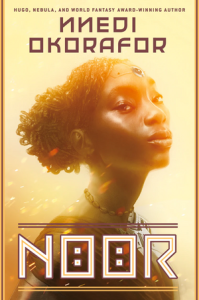Title: Noor
Author: Nnedi Okorafor
Genre: Science Fiction
Trigger Warnings: Violence, blood, death, death of animals, terrorism (mentions), body horror, injury, ableism (severe), sexual content (mentions), fire, natural disasters, car crash (mentions), medical content
Note: Trigger warnings in DNF books only cover the part I read. There may be triggers further in the book that I did not encounter.
Read To: 77%
Back Cover:
Anwuli Okwudili prefers to be called AO. To her, these initials have always stood for Artificial Organism. AO has never really felt…natural, and that’s putting it lightly. Her parents spent most of the days before she was born praying for her peaceful passing because even in-utero she was “wrong”. But she lived. Then came the car accident years later that crippled her even further. Yet instead of viewing her strange body the way the world views it, as freakish, unnatural, even the work of the devil, AO embraces all that she is: A woman with a ton of major and necessary body augmentations. And then one day she goes to her local market and everything goes wrong.
Once on the run, she meets a Fulani herdsman named DNA and the race against time across the deserts of Northern Nigeria begins. In a world where all things are streamed, everyone is watching the “reckoning of the murderess and the terrorist” and the “saga of the wicked woman and mad man” unfold. This fast-paced, relentless journey of tribe, destiny, body, and the wonderland of technology revels in the fact that the future sometimes isn’t so predictable. Expect the unaccepted.
Review:
I have thoroughly enjoyed several of Nnedi Okorafor’s books (*cough*Binti*cough*), and found others to be just okay. Noor unfortunately falls into the latter category.
Nnedi’s books are not much for strong plots. This one is very similar to Remote Control in that a girl (in this case, a woman) who is different and powerful and terrifying to everyone else is driven from her home and goes on a long journey. In this case, AO was born with her legs withered and one arm just not there. A car accident in her teens destroyed her legs even further. She chose cybernetic replacements and other technological enhancements that are basically really awesome disability aids (honestly, if I had the option to replace my legs instead of using a cane I’d do it in a heartbeat). But the people around her think because so much of her body is metal that she has somehow become less than human.
On her journey to nowhere in particular, she joins DNA, a herdsman with only two cows after his group and most of their cattle were massacred for being herdsmen. AO wants people to accept that being more high-tech doesn’t make her less human, and DNA wants people to accept that sticking to his people’s traditional ways of life instead of selling his cows and going to work for a global megacorporation doesn’t make him a lesser person.
As is typical of Nnedi’s work, there isn’t much of a plot. The journey is the story, and AO and DNA travel to DNA’s village, through an eternal sandstorm, and other interesting places. The story is told in first person, and AO’s tangents build up the africanfuturist world these characters inhabit. I was interested at first as I was getting oriented to the characters and the world, and then the story started to drag. Neither of the characters had goals, there was no endpoint in sight, and it didn’t feel like either the characters or the story were going anywhere.
AO and DNA finally got to a place that seemed like it would be safe, and they both seemed to like it there. It felt like a reasonable ending for the kind of story this is and I was expecting the story to wrap up soon. But there kept being more chapters. Finally, I checked the timestamp and discovered there was still a quarter of the book to go. I had no idea what would be happening in all that time – neither character had found anything like a goal and there was no current outside threat to escape – and I was getting really tired of following along on what felt like a pointless journey.
So I stopped. I liked the world and the characters could have been interesting if there had been any point to the story. They weren’t going anywhere in particular, they had no goals or objectives – not even “find somewhere safe,” that happened by accident – and I was, quite frankly, bored. If even one of them had been trying to do anything in particular, I think I would have enjoyed this story a lot more.

